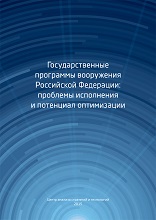Centre for Analysis of Strategies and Technologies publishes analytical report titled "State Armaments Programmes of the Russian Federation: challenges of implementation and room for optimisation"

Centre for Analysis of Strategies and Technologies (CAST) has circulated its analytical report titled “State Armaments Programmes of the Russian Federation: challenges of implementation and room for optimisation”
The report dwells on the challenges in implementing the current Russian State Armaments Programme for years 2011 to 2020 (GPV-2020), as well as recommendations to refine the follow-up State Armaments Programme for years 2016 to 2025 (GPV-2025) yet to be finalized.
As stated in the introductory part of the report, at present, Russia has faced a series of fundamental challenges — geopolitical, political, economic and military. Most of them were either not allowed for by the development scenarios having been implemented until late, or were considered little less than unlikely, which poses a question of the long-term planning quality in the future force and capability development.
Threats and risks which arose with the beginning of the civil war in Ukraine, along with a drastic strain in relations with the United States and a range of the European nations and strategic deterioration in the Western sector of the Russia’s perimeter essentially led to resurrection of the cold war situation. Prospects for an extended and fully fledged political standoff with the world most developed nations seem to be looming up, with an accent on the military aspect of this standoff, or plainly speaking, a standoff driven by the defence capabilities.
It is in this context, that the role of defence factors in the national security of the Russian Federation is growing, first and foremost, that of the Russian Armed Forces buildup. The currently implemented GPV-2020 programme is one of the key elements of this buildup. Furthermore, pursuant to the standards set back in the Soviet era, work has already begun on drafting the follow-up GPV-2025 programme. Yet this could be checked and start being implemented with delay due to the troubled economic situation in the country at the present time.
Date: 21.04.2015
